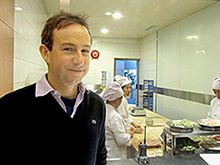October 9, 2015
College of Veterinary Medicine's new executive director for international programs

Keith Hamilton has joined the College of Veterinary Medicine as its new executive director for international programs.
"This is a new position within our college designed to broaden our educational curriculum while also helping to create new opportunities for research growth and international collaboration for our faculty," said Tammy Beckham, dean of the College of Veterinary Medicine. "Dr. Hamilton brings a unique background and skills that align precisely with this position. His role in our college will help further support the university's 2025 vision to become a Top 50 public research university, and we are thrilled to have him join our college."
Hamilton spent the last eight years with the World Organisation for Animal Health where he led and developed programs for strengthening preparedness against emerging diseases and pandemics, global biological security, capacity building through twinning and international network building, and working on global rinderpest post-eradication efforts.
"Global health has significantly benefited from international discussion, which has led to a common understanding that long term well-being depends on the sustainable health of humans, animals and the ecosystem," Hamilton said. "I'm looking forward to working with scientists and students at K-State to build on the current impressive international program to further facilitate opportunities that will enrich their careers and contribute to improved global health and well-being."
The executive director for international programs will specifically work to identify areas where the College of Veterinary Medicine and Kansas State University can participate in international programs such as the global health security agenda, biological threat reduction, World Organisation for Animal Health twinning programs, human-animal interface activities, work with the Food and Agricultural Organization of the United Nations and the U.S. Agency for International Development on capacity building, and the global one health initiative — working with faculty to identify opportunities and work to write grants and obtain extramural funding to support these activities.
The position will encourage and work with faculty and students on global initiatives such as capacity building and international development; facilitate foreign exchange of veterinary students, faculty and staff for educational enhancements and to provide contributions to the field of international veterinary medicine; helping students, faculty and staff contribute to the understanding of international veterinary medicine and animal health globally; develop and facilitate international veterinary learning experiences in the form of externships for professional students; evaluate potential to offer a certificate in international veterinary medicine for Doctor of Veterinary Medicine students; teach courses on international veterinary medicine; and highlight for students the potential role of veterinarians in policy and/or technical expertise in national government, international organizations, nongovernmental organizations, etc.
Hamilton will work closely with Walter Renberg, professor and section head for small animal surgery as well as the director of international programs for the College of Veterinary Medicine. The two will work together to further international efforts across the college and university in research and teaching.
Hamilton has a master's degree in control of infectious disease from the London School of Hygiene and Tropical Medicine, and a degree in veterinary science from the Liverpool University Veterinary School, U.K. He is a member of the Royal College of Veterinary Surgeons.
Hamilton spent several years in clinical mixed animal practice and field disease control programs in the U.K, and overseas before joining the U.K. government as a senior veterinary adviser. He was then seconded to the World Organisation for Animal Health, initially to build international pandemic preparedness in response to zoonotic H5N1 highly pathogenic avian influenza.
